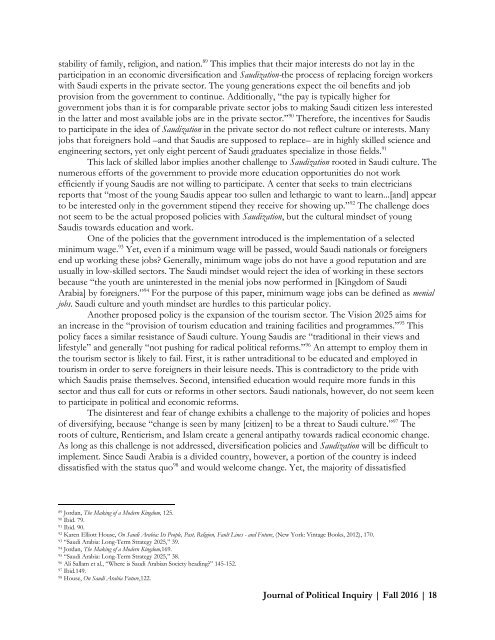Fall2016_Final
Create successful ePaper yourself
Turn your PDF publications into a flip-book with our unique Google optimized e-Paper software.
stability of family, religion, and nation. 89 This implies that their major interests do not lay in the<br />
participation in an economic diversification and Saudization-the process of replacing foreign workers<br />
with Saudi experts in the private sector. The young generations expect the oil benefits and job<br />
provision from the government to continue. Additionally, “the pay is typically higher for<br />
government jobs than it is for comparable private sector jobs to making Saudi citizen less interested<br />
in the latter and most available jobs are in the private sector.” 90 Therefore, the incentives for Saudis<br />
to participate in the idea of Saudization in the private sector do not reflect culture or interests. Many<br />
jobs that foreigners hold –and that Saudis are supposed to replace– are in highly skilled science and<br />
engineering sectors, yet only eight percent of Saudi graduates specialize in those fields. 91<br />
This lack of skilled labor implies another challenge to Saudization rooted in Saudi culture. The<br />
numerous efforts of the government to provide more education opportunities do not work<br />
efficiently if young Saudis are not willing to participate. A center that seeks to train electricians<br />
reports that “most of the young Saudis appear too sullen and lethargic to want to learn...[and] appear<br />
to be interested only in the government stipend they receive for showing up.” 92 The challenge does<br />
not seem to be the actual proposed policies with Saudization, but the cultural mindset of young<br />
Saudis towards education and work.<br />
One of the policies that the government introduced is the implementation of a selected<br />
minimum wage. 93 Yet, even if a minimum wage will be passed, would Saudi nationals or foreigners<br />
end up working these jobs? Generally, minimum wage jobs do not have a good reputation and are<br />
usually in low-skilled sectors. The Saudi mindset would reject the idea of working in these sectors<br />
because “the youth are uninterested in the menial jobs now performed in [Kingdom of Saudi<br />
Arabia] by foreigners.” 94 For the purpose of this paper, minimum wage jobs can be defined as menial<br />
jobs. Saudi culture and youth mindset are hurdles to this particular policy.<br />
Another proposed policy is the expansion of the tourism sector. The Vision 2025 aims for<br />
an increase in the “provision of tourism education and training facilities and programmes.” 95 This<br />
policy faces a similar resistance of Saudi culture. Young Saudis are “traditional in their views and<br />
lifestyle” and generally “not pushing for radical political reforms.” 96 An attempt to employ them in<br />
the tourism sector is likely to fail. First, it is rather untraditional to be educated and employed in<br />
tourism in order to serve foreigners in their leisure needs. This is contradictory to the pride with<br />
which Saudis praise themselves. Second, intensified education would require more funds in this<br />
sector and thus call for cuts or reforms in other sectors. Saudi nationals, however, do not seem keen<br />
to participate in political and economic reforms.<br />
The disinterest and fear of change exhibits a challenge to the majority of policies and hopes<br />
of diversifying, because “change is seen by many [citizen] to be a threat to Saudi culture.” 97 The<br />
roots of culture, Rentierism, and Islam create a general antipathy towards radical economic change.<br />
As long as this challenge is not addressed, diversification policies and Saudization will be difficult to<br />
implement. Since Saudi Arabia is a divided country, however, a portion of the country is indeed<br />
dissatisfied with the status quo 98 and would welcome change. Yet, the majority of dissatisfied<br />
89<br />
Jordan, The Making of a Modern Kingdom, 125.<br />
90<br />
Ibid. 79.<br />
91<br />
Ibid. 90.<br />
92<br />
Karen Elliott House, On Saudi Arabia: Its People, Past, Religion, Fault Lines - and Future, (New York: Vintage Books, 2012), 170.<br />
93<br />
“Saudi Arabia: Long-Term Strategy 2025,” 39.<br />
94<br />
Jordan, The Making of a Modern Kingdom,169.<br />
95<br />
“Saudi Arabia: Long-Term Strategy 2025,” 38.<br />
96<br />
Ali Sallam et al., “Where is Saudi Arabian Society heading?” 145-152.<br />
97<br />
Ibid.149.<br />
98<br />
House, On Saudi Arabia Future,122.<br />
Journal of Political Inquiry | Fall 2016 | 18
















